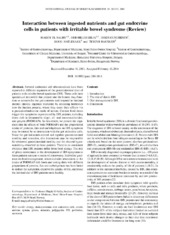| dc.contributor.author | El-Salhy, Magdy | en_US |
| dc.contributor.author | Gilja, Odd Helge | en_US |
| dc.contributor.author | Gundersen, Doris Irene | en_US |
| dc.contributor.author | Hatlebakk, Jan G | en_US |
| dc.contributor.author | Hausken, Trygve | en_US |
| dc.date.accessioned | 2015-09-22T12:39:04Z | |
| dc.date.available | 2015-09-22T12:39:04Z | |
| dc.date.issued | 2014-08 | |
| dc.identifier.issn | 1107-3756 | |
| dc.identifier.uri | https://hdl.handle.net/1956/10500 | |
| dc.description.abstract | Several endocrine cell abnormalities have been reported in different segments of the gastrointestinal tract of patients with irritable bowel syndrome (IBS). These cells have specialized microvilli that project into the lumen; they function as sensors for the gut contents and respond to luminal stimuli (mostly ingested nutrients) by releasing hormones into the lamina propria, where they exert their effects via a paracrine/endocrine mode of action. Certain food items trigger the symptoms experienced by IBS patients, including those rich in fermentable oligo-, di- and monosaccharides, and polyols (FODMAPs). In this review, we present the argument that the effects of both FODMAPs and the proportional intake of proteins, fats and carbohydrates on IBS symptoms may be caused by an interaction with the gut endocrine cells. Since the gut hormones control and regulate gastrointestinal motility and sensation, this interaction may be responsible for abnormal gastrointestinal motility and the visceral hypersensitivity observed in these patients. There is no consistent evidence that IBS patients suffer from food allergy. The role of gluten intolerance in the development of IBS symptoms in these patients remains a matter of controversy. Individual guidance on food management, which includes restrictions in the intake of FODMAP-rich foods and testing diets with different proportions of proteins, fats and carbohydrates has been found to reduce the symptoms, improve the quality of life, and make the habitual diet of IBS patients more healthy. | en_US |
| dc.language.iso | eng | eng |
| dc.publisher | Spandidos | eng |
| dc.rights | Attribution CC BY | eng |
| dc.rights.uri | http://creativecommons.org/licenses/by/4.0 | eng |
| dc.subject | allergy | eng |
| dc.subject | cholecystokinin | eng |
| dc.subject | Diet | eng |
| dc.subject | endocrine cells | eng |
| dc.subject | enteric nervous system | eng |
| dc.subject | gluten | eng |
| dc.subject | minerals | eng |
| dc.subject | polypeptide YY | eng |
| dc.subject | probiotics | eng |
| dc.subject | serotonin | eng |
| dc.title | Interaction between ingested nutrients and gut endocrine cells in patients with irritable bowel syndrome (Review) | en_US |
| dc.type | Peer reviewed | |
| dc.type | Journal article | |
| dc.date.updated | 2015-07-29T12:51:21Z | |
| dc.description.version | publishedVersion | en_US |
| dc.rights.holder | Copyright 2014 The Authors | |
| dc.identifier.doi | https://doi.org/10.3892/ijmm.2014.1811 | |
| dc.identifier.cristin | 1144050 | |
| dc.source.journal | International Journal of Molecular Medicine | |
| dc.source.40 | 34 | |
| dc.source.14 | 2 | |
| dc.source.pagenumber | 363-371 | |
| dc.subject.nsi | VDP::Medisinske fag: 700::Klinisk medisinske fag: 750::Gasteroenterologi: 773 | |
| dc.subject.nsi | VDP::Midical sciences: 700::Clinical medical sciences: 750::Gastroenterology: 773 | |

